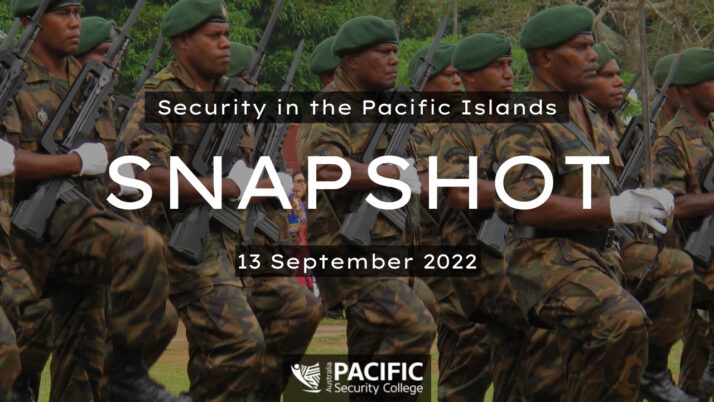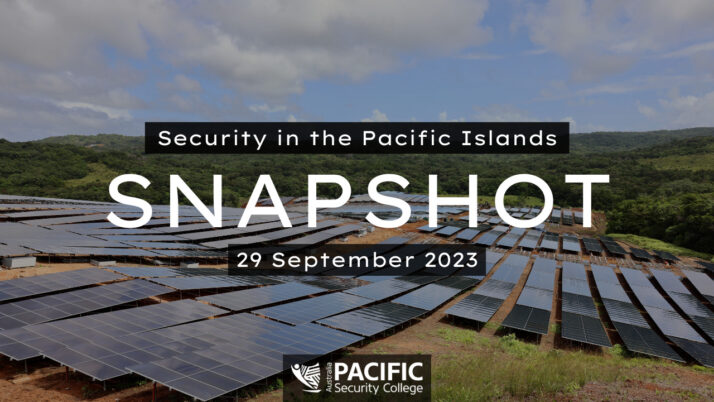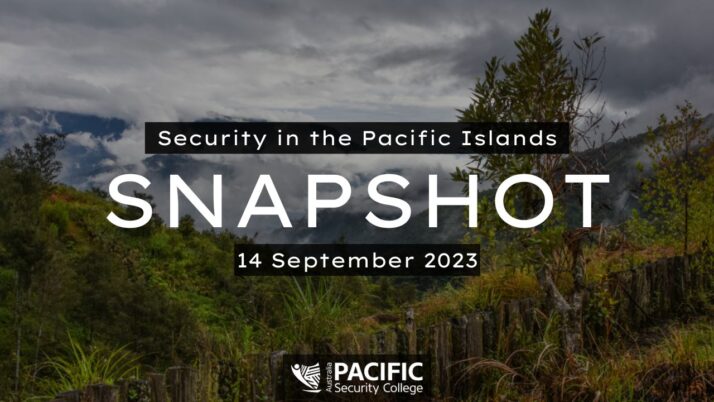Pacific Security Snapshot: 13 September 2022

Election uncertainty is featuring in news across the Pacific, while several countries in the region are wrestling with environmental security challenges.
Tensions have continued in Solomon Islands, with a moratorium announced on foreign navy vessels, following controversy around an American coast guard vessel which was denied entry to Honiara for a scheduled port call three weeks ago.
On 30 August, Solomon Islands Prime Minister Manasseh Sogavare stated that there was ‘misinformation’ surrounding the American Coast guard incident, asserting that approval was delayed, but later granted, after the vessel had already moved on to Papua New Guinea (PNG).
Prime Minister Sogavare stated that no foreign naval vessels would be allowed to enter the country while Solomon Islands reviews its national capacity to police its Exclusive Economic Zone. Foreign military vessels responding to assistance requests from the Solomon Islands government, along with vessels from Australia, Fiji, and New Zealand deployed under the Solomon Islands International Assistance Force (SIIAF), are exempt from the moratorium.
Separately, the prime minister has accepted Australia’s offer of financial assistance for the country’s recently delayed national election, despite previously referring to it as ‘foreign interference’. The offer was made public after the Solomon Islands government stated that it intended to defer the election from 2023 to 2024 due to the logistical strain of hosting the Pacific Games in Honiara in 2023.
Whilst it initially appeared as if the funding would only apply if the election was held in 2023, Foreign Minister Penny Wong later confirmed that Australia was willing to extend this to an election in 2024 as well. Solomon Islands Opposition Leader Matthew Wale has expressed concern that public protests may arise in response to the deferral.
Vanuatu was the site of another electoral controversy last week, as the Supreme Court heard an application submitted by 27 opposition members of parliament (MPs) against Prime Minister Bob Loughman’s dissolution of parliament on 18 August.
The opposition claimed the dissolution was illegal and intended to bring a motion of no confidence against Loughman if successful. However, the Court ruled against the opposition MPs and, as such, a snap election slated for October will go ahead.
Kiribati has been left without a high-level court following the suspension of all three judges from the Court of Appeal. The suspension was in response to the court’s ruling that the suspension and attempted deportation of High Court judge David Lambourne, husband of opposition leader Tessie Lambourne, were unconstitutional. The government justified the suspensions as protecting Kiribati from “judicial tyranny”.
The country is also facing a worsening health and environmental crisis, as drought continues to cause increased salinity in water sources. The United Nations declared that the ongoing drought is at a critical stage, with fears of malnutrition and other illnesses as the community reduces health practices to limit water usage. The national government declared a state of disaster for the country in June 2022, with below-normal rainfall forecast to continue until the end of the year.
In other environmental news, President of French Polynesia Edouard Fritch has acted upon on his Pacific Island Forum resolution to ban seabed mining in the territory. Despite affirming his party’s support the move, leader of the opposition separatist Tavini Huiraatira party, Oscar Temaru, claimed that French Polynesia could gain up to US$75 trillion dollars from negotiating mining rights if it becomes independent from France.
In PNG, Prime Minister James Marape announced his government’s commitment to a 10-15 year health program worth over US$12 billion, more than the current annual budget for education or infrastructure. Marape argued that COVID-19 has been a wake-up call for PNG and that his government is committed to improving the country’s health sector.
In other PNG news, Foreign Minister Justin Tkatchenko revealed that his country is moving to negotiate a security treaty with Australia and, potentially, New Zealand. The foreign ministers of both countries visited PNG at the start of September, with Minister Wong noting that discussions were only in “very, very early” stages.
In region-wide news, the agenda has been set for the White House summit between 12 invited Pacific Island leaders and United States President Joe Biden on 28 and 29 September. Despite no confirmation on which countries have accepted the invitation, the summit will focus on non-traditional security concerns, including climate change, environmental protection, and pandemic response, as well as maritime security.
The information in this piece is accurate as of 12pm (AEST), Friday 9 September.
More Stories

Security Snapshot - 29 Sep 2023
Pacific Security Snapshot | 29 September 2023
The security stories shaping the region ➣ 2nd United States-Pacific Islands Forum Summit ➣ Niue and Cook Islands forge diplomatic ties with United States ➣ Chinese navy vessel arrives in Papua New Guinea ➣ Pacific climate change advocacy at the United Nations ➣ El Niño is officially declared ➣ Fifteenth Pacific Health Ministers Meeting in…

Security Snapshot - 15 Sep 2023
Pacific Security Snapshot | 15 September 2023
The security stories shaping the region ➣ Pacific Islands Forum Women Leaders Meeting ➣ Pacific High-Level Dialogue on Climate Change ➣ Fiji to sign Status of Forces Agreement with France ➣ Palau expands United States maritime law enforcement agreement ➣ Papua New Guinea special elite force to combat tribal violence ➣ Australia extends police presence…






